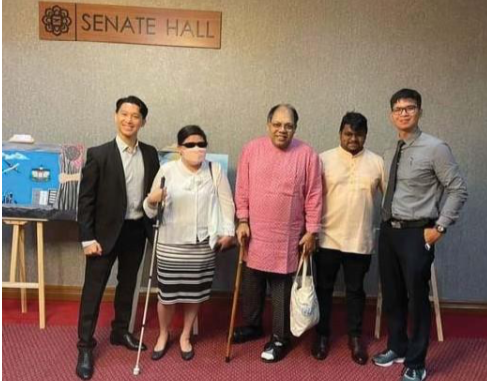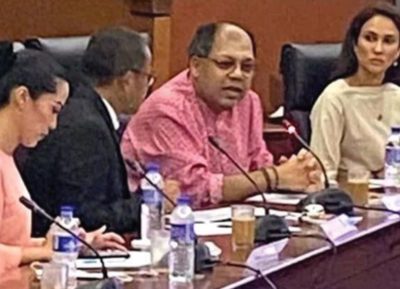MIRM and UNHCR Host Roundtable on Refugee Education: Driving Change in Kuala Lumpur

In December 2022, the Make It Right Movement (MIRM), in collaboration with the United Nations High Commission for Refugees (UNHCR) and other key stakeholders, hosted a Roundtable on Refugee Education in Kuala Lumpur. This significant event brought together educators, policymakers, refugee advocates, non-governmental organisations (NGOs) and representatives from refugee communities to discuss the pressing issue of education for refugees in Malaysia. The focus of the roundtable was to address current challenges, share best practices and collaboratively develop sustainable solutions for providing inclusive education to refugee children and youth.
The roundtable, themed “Moving Forward: Ensuring Inclusive and Sustainable Education for Refugees”, served as a platform for key players in the refugee education ecosystem to exchange ideas, foster partnerships and explore innovative approaches to improving access to education for refugees. Participants acknowledged that education is a fundamental human right, critical for the development of refugees and their successful integration into host communities.
The Urgent Need for Refugee Education in Malaysia
Malaysia is home to tens of thousands of refugees, primarily from countries such as Myanmar (including the Rohingya), Syria, Afghanistan and Somalia. However, despite their large numbers, refugees in Malaysia face numerous barriers to accessing education. Malaysia is not a signatory to the 1951 Refugee Convention and refugees do not have legal status in the country, making it difficult for them to enroll in formal schooling. Many refugee children are left with no choice but to attend informal learning centers run by NGOs or community organisations. While these centers provide essential educational services, they are often under-resourced and unable to meet the full range of needs faced by refugee learners. The Roundtable on Refugee Education sought to address these challenges by creating a dialogue around sustainable, long-term solutions for improving education access for refugee communities.
Objectives of the Roundtable on Refugee Education
The Roundtable on Refugee Education had several key objectives:
Assess the Current State of Refugee Education: The roundtable provided a platform for stakeholders to assess the current state of refugee education in Malaysia, including the challenges faced by refugee children and the limitations of informal education centers. Participants examined the root causes of these challenges, including legal and policy barriers, lack of funding and social exclusion.
Promote Inclusive and Sustainable Education: A primary goal of the event was to discuss how education systems in Malaysia can become more inclusive, ensuring that refugee children and youth have access to quality, equitable education. This included exploring partnerships with local schools, government agencies and international organisations to create more inclusive policies and practices.
Foster Collaboration Between Stakeholders: The roundtable aimed to foster stronger collaboration between stakeholders, including NGOs, government representatives, educators and refugee-led organisations. By working together, participants explored opportunities for improving the coordination of refugee education services and ensuring that resources are effectively utilized.
Develop Policy Recommendations: The event also sought to develop concrete policy recommendations to improve refugee education in Malaysia. These recommendations were based on the insights and experiences shared by participants and were designed to influence future policy discussions on education access for refugees.
Key Themes Discussed at the Roundtable
The Roundtable on Refugee Education featured panel discussions, workshops and breakout sessions that allowed participants to engage in meaningful conversations about the most pressing issues related to refugee education. Several key themes emerged from these discussions.
1. Challenges in Accessing Formal Education
One of the central themes of the roundtable was the lack of access to formal education for refugee children in Malaysia. Participants discussed how the lack of legal status prevents refugees from enrolling in government schools, leaving them dependent on informal learning centers. These centers, while providing a vital service, often struggle with limited resources, inadequate infrastructure and a lack of trained teachers. Participants emphasised the importance of creating pathways for refugee children to access formal education systems. This could involve partnerships with local schools that allow refugee students to attend classes alongside Malaysian students, as well as advocating for changes in national education policies that permit the enrollment of refugees in public schools.
2. Supporting Teachers and Educators in Refugee Education
The roundtable highlighted the need to provide greater support to teachers and educators working in refugee learning centers. Many of these educators are undertrained and the centers often lack sufficient funding for teacher salaries, training and professional development. Participants discussed the importance of offering teacher training programmes specifically tailored to the needs of refugee learners, including training on trauma-informed teaching, language acquisition and culturally responsive pedagogy. By building the capacity of educators, learning centers can provide higher-quality education and better support for refugee children.
3. Innovative Approaches to Refugee Education
Another important theme was the need for innovative approaches to refugee education, particularly in light of the limitations of traditional schooling systems. Participants explored how digital learning platforms, blended learning models and community-based education initiatives could provide alternative pathways for refugee children to receive education. Several organisations shared examples of successful digital learning programmes that allow refugee students to access educational content through mobile devices or online platforms. These programmes are especially valuable for refugees living in remote areas or those who are unable to attend physical learning centers due to transportation or security concerns.
4. Mental Health and Psychosocial Support for Refugee Learners
Participants also recognised the critical need to address the mental health and psychosocial needs of refugee learners. Many refugee children have experienced trauma, displacement and loss, which can have a profound impact on their ability to learn and succeed in school. The roundtable discussed the importance of integrating mental health support into refugee education programs, including providing access to counseling services, peer support groups and trauma-informed teaching practices. By addressing these psychosocial needs, educators can create a more supportive learning environment that promotes both emotional well-being and academic success.
5. Advocating for Policy Change and Legal Reforms
A key takeaway from the roundtable was the urgent need for policy advocacy to ensure that refugee children in Malaysia have access to education. Participants discussed how national and international laws can be leveraged to advocate for refugee rights, including the right to education. The roundtable also explored potential legal reforms that could allow refugee children to enroll in public schools, recognise their academic credentials and provide pathways to higher education. Participants called on both the Malaysian government and international bodies to take action to protect the educational rights of refugee children.
Outcomes and Recommendations
The Roundtable on Refugee Education generated a series of recommendations aimed at improving access to education for refugees in Malaysia. Some of the key outcomes and recommendations include:
Partnerships with Local Schools: Participants recommended exploring partnerships between refugee learning centers and local schools to allow refugee children to attend formal classes. These partnerships could involve government support, NGO facilitation and collaboration with local communities.
Teacher Training and Support: The roundtable emphasised the need to invest in teacher training and support for educators working with refugee students. Participants called for more targeted teacher training programmes, as well as increased funding for salaries, professional development and classroom resources.
Advocacy for Policy Change: Participants agreed on the need to advocate for policy changes that would allow refugee children to access formal education. This includes advocating for the recognition of refugee academic credentials, as well as exploring legal reforms that grant refugees the right to enroll in public schools.
Support for Digital Learning Initiatives: Given the limitations of traditional schooling systems, participants recommended expanding digital learning initiatives that allow refugee children to access education through online platforms. These programmes can complement the work of informal learning centers and provide alternative pathways for refugee students.
Mental Health Integration: The roundtable highlighted the importance of integrating mental health and psychosocial support into refugee education programmes. Participants recommended providing schools and learning centers with the resources and training needed to offer trauma-informed care and counseling services.
Looking Ahead: The Path Forward for Refugee Education
The Roundtable on Refugee Education marked a significant step forward in the collective effort to improve access to education for refugees in Malaysia. The event fostered meaningful dialogue, built stronger partnerships and generated actionable recommendations for advancing refugee education.
MIRM, UNHCR and other stakeholders are committed to implementing the recommendations generated during the roundtable and continuing the work to advocate for the educational rights of refugees. Moving forward, these organisations will work together to develop innovative solutions, push for policy reforms and ensure that every refugee child has the opportunity to receive a quality education and build a brighter future.
